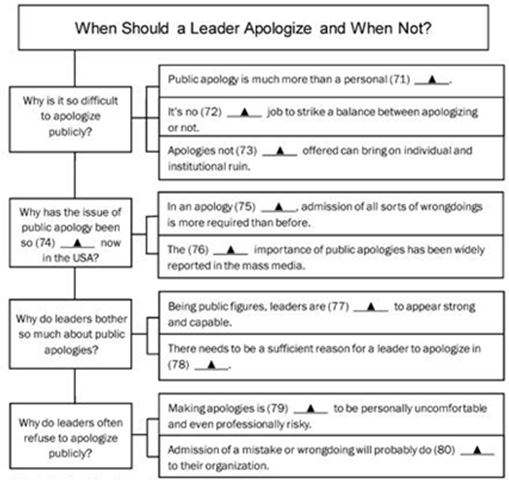6.When difficult people express themselves orally,they generally want at least two things:they've been heard and they've been understand.As a good communicator should be a good listener,five steps are advocated toward good listening.
The first step is cooperating(合作).How does a difficult person know that you're listening and understanding?In fact,it's through the way you look and should while he is talking.You may help him to fully express his thoughts and feelings.You do this by nodding your head in agreement,making certain sounds of understanding.
When the person begins to repeat what's been said,it's signal of step two:turning back.It means that you repeat back some words he is using,sending a clear signal that you're listening carefully and that you think what he is saying is important.
Having heard what he has to say,the next step is clarifying.At this point,you start to gather information about what is being communicated.Ask some open-ended questions,which will allow you to figure out what intention he is hoping to satisfy.
The fourth step is to summarize(概括)what you've heard.This allows you to make sure that both you and the difficult person are on the same page.When you do this,two things happen.First,if you've shown that you're making an effort to understand completely.This increases the possibility of gaining cooperation from him.
Having listened carefully,you've now arrived at the point of confirming with the person that he feels that his thoughts have been fully voiced.Ask if he feels understood.
When enough sincere listening,questioning,and remembering are brought together,understanding is usually achieved and a difficult person becomes less difficult and more cooperative.
0 136026 136034 136040 136044 136050 136052 136056 136062 136064 136070 136076 136080 136082 136086 136092 136094 136100 136104 136106 136110 136112 136116 136118 136120 136121 136122 136124 136125 136126 136128 136130 136134 136136 136140 136142 136146 136152 136154 136160 136164 136166 136170 136176 136182 136184 136190 136194 136196 136202 136206 136212 136220 151629
The first step is cooperating(合作).How does a difficult person know that you're listening and understanding?In fact,it's through the way you look and should while he is talking.You may help him to fully express his thoughts and feelings.You do this by nodding your head in agreement,making certain sounds of understanding.
When the person begins to repeat what's been said,it's signal of step two:turning back.It means that you repeat back some words he is using,sending a clear signal that you're listening carefully and that you think what he is saying is important.
Having heard what he has to say,the next step is clarifying.At this point,you start to gather information about what is being communicated.Ask some open-ended questions,which will allow you to figure out what intention he is hoping to satisfy.
The fourth step is to summarize(概括)what you've heard.This allows you to make sure that both you and the difficult person are on the same page.When you do this,two things happen.First,if you've shown that you're making an effort to understand completely.This increases the possibility of gaining cooperation from him.
Having listened carefully,you've now arrived at the point of confirming with the person that he feels that his thoughts have been fully voiced.Ask if he feels understood.
When enough sincere listening,questioning,and remembering are brought together,understanding is usually achieved and a difficult person becomes less difficult and more cooperative.
| Topic | (76)Listen/Listeningto understand |
| Reason | Difficult people hope they have been heard and(77)understoodwhen they express themselves. |
| (78) on listening | ◆(79)Nodin agreement and make some sounds of understanding while a difficult person is speaking. ◆Repeat some(80)wordsthat you have heard. ◆Collect information about the person's expressions and find his(81)intention. ◆Give a(82)summaryof what the person has said. ◆Confirm that the person gains(83)satisfactionfrom speaking his thoughts. |
| Result | A difficult person will be(84)easierto cooperate with if understanding is achieved. |
| Comment | You may unlock the doors to difficult people's(85)hearts/mindsafter you listen and understand |
